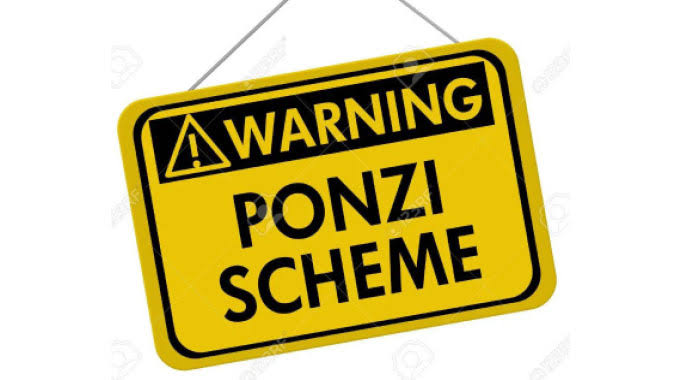Ponzi schemes are fraudulent schemes that promise high returns on investments but pay out existing investors with the money from new investors. They are unsustainable and eventually collapse, leaving many people in financial ruin.
Unfortunately, many Nigerians have fallen victim to Ponzi schemes that masquerade as investment schemes. They are lured by the attractive and unrealistic promises of high returns, such as doubling or tripling their money in a short period. They are also influenced by social pressure and testimonials from their friends, family, or celebrities who claim to have benefited from the schemes.
The consequences of falling for a Ponzi scheme can be devastating for the investors and the society. They can lose their hard-earned money, their trust in the financial system, and their dignity. They can also face legal actions, such as lawsuits, fines, or imprisonment if they are found to be involved in the scheme. Moreover, they can contribute to the instability and fragility of the economy, as the collapse of a large-scale Ponzi scheme can trigger a panic and a crisis in the financial markets.
Nigeria has witnessed several Ponzi schemes which were disguised as investment schemes in the past few years, some of which are:
Brisk Capital Limited, operated by Dominic Joshua Ngene, a 21-year-old self-styled investment expert, allegedly diverted over N2 billion from over 500 investors, promising them 60% returns on investments in real estate, forex, oil and gas, etc. He was arrested by the police special fraud unit in May 2021.
Chinmark Group, operated by Marksman Chinedu Ijiomah, a civil engineer, entrepreneur, and philanthropist, allegedly defrauded over 10,000 investors of over N10 billion, promising them 50% returns on investments in agriculture, transportation, finance, etc. He was declared wanted by the police in April 2023.
Quintessential Investment Company Limited, operated by Joshua Adeyinka Kayode defrauded Nigerians in billions in the scheme of an invested scheme and was caught by the police and placed on bail by the court in Lagos in 2021.
In trying to find out why Nigerians fall for Ponzi schemes, some experts on this issue, particularly a security expert, Nnamdi Chife, who is the CEO of Chive GPS, provided some insights.
“As a security and debt recovery expert, I have seen many cases of Nigerians falling for Ponzi schemes in the name of investment schemes. These schemes are nothing but scams that exploit the greed, ignorance, and desperation of unsuspecting investors. They promise unrealistic and unsustainable returns while using the money from new investors to pay off the old ones. They operate in the shadows, without any transparency, regulation, or accountability.
“They use various tactics to lure and deceive investors, such as social media, celebrity endorsements, sophisticated websites, and psychological manipulation. They leave behind a trail of financial and emotional devastation, as well as legal and economic consequences when they collapse or disappear. The best way to avoid these schemes is to be vigilant and educated about the dangers and signs of Ponzi schemes. Investors should do their due diligence and research before investing in any scheme.
“They should verify the credibility and legitimacy of the scheme’s operators, regulators, and auditors. They should ask for and review the scheme’s documents, such as the prospectus, the contract, the financial statements, and the audit reports. They should assess the scheme’s risks and returns, such as the source, the rate, the frequency, and the variability of the payouts. They should diversify and balance their portfolio, such as investing in different assets, sectors, and markets. They should be realistic and cautious about their expectations, such as avoiding greed, fear, and herd mentality. By doing so, investors can protect themselves and their money from the scams and frauds of Ponzi schemes. They can also support and participate in the development and growth of the legitimate and regulated investment schemes and the financial sector in Nigeria,” Chife stated.
Observing that many of these Ponzi schemes disguised as finance houses had to invest heavily in advertising and marketing promotions to attract new audiences, also Israel Oladipupo Ogunseye, a marketing and communications expert, shared his perspective thus; “These schemes are cleverly designed to appeal to the emotions and aspirations of unsuspecting investors. They promise high and quick returns while using persuasive and deceptive techniques to market their schemes, such as social media, celebrity endorsements, sophisticated websites, and psychological manipulation. They operate in the shadows, without any transparency, regulation, or accountability. They leave behind a trail of financial and emotional devastation, as well as legal and economic consequences when they collapse or disappear.
“Unfortunately, I observed that some of these schemes had billboard advertisements which I expect to have gone through the APCON approvals which may have not been diligent. Even many of them deployed Influencers to promote their Ponzi schemes openly which meant a lack of trust in the financial ecosystem as well as in digital banking products.”
In all, it is important that all stakeholders come together to ensure that these companies do not come back to afflict Nigerians again in any guise whatsoever either as finance houses, investment groups, crowdfunding programs or whatever. However, some financial experts believe that negligence got better part of some investors who did not carry out a proper due diligence to ascertain the type of company, founders, and interest rates on offer.
We’ve got the edge. Get real-time reports, breaking scoops, and exclusive angles delivered straight to your phone. Don’t settle for stale news. Join LEADERSHIP NEWS on WhatsApp for 24/7 updates →
Join Our WhatsApp Channel











